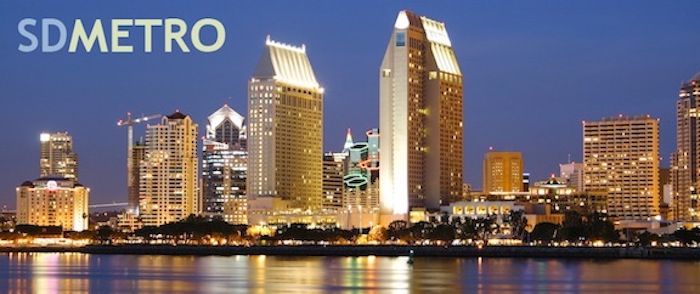Daily Business Report-Dec. 24, 2018
Politics Report:
The 12 Days of … San Diego Politics in 2018
By Scott Lewis and Andrew Keats | Voice of San Diego
It was another wild year in San Diego politics – and by wild, we mean that few problems were resolved but we made a great deal of commotion trying to resolve them. So kudos to us.
Here are the 12 noisiest political days of the year for a region in which doing something – anything! – seems to require a Christmas miracle.
Jan. 18: Foreshadowing Georgette Gomez’s Rise
The year began the way it ended for Georgette Gomez. On Jan. 18, she was named the new chair of the Metropolitan Transit System, putting her in the driver’s seat as the agency went about plotting a potential tax increase to fund transit expansion on the 2020 ballot. By year’s end, her colleagues had unanimously made Gomez, the councilwoman from District 9, the new Council president, putting her in charge of the Council’s new Democratic supermajority, where she could, hypothetically, run roughshod over a Republican mayor.
But the day she won MTS chair was revealing. Gomez is not a squishy, pro-business moderate; she’s an unapologetic progressive who got into public service to address inequities she sees in regional decision-making.
And yet, Mayor Kevin Faulconer made a rare trip to MTS that morning to support her candidacy even as fellow Republican Supervisor Ron Roberts sought the seat. Faulconer’s presence effectively ended the contest, and Gomez got the job. Faulconer later said it was simple: Gomez is open and honest with him, which makes her easy to work with, regardless of their differences. There was a similar sentiment when she was unanimously elected Council president, and every Republican said she’d been honest with them, which cuts down on surprises.
Gomez is now in a position as strong as anyone, including Faulcoenr, to shape the future of the region. She’s the chair at MTS, the Council president and holds a powerful vote at the San Diego Association of Governments. At this time last year, she was just another councilwoman. Things change.
March 7: The Airport Wars Begin
When Assemblywoman Lorena Gonzalez announced her newest disruptive piece of legislation, it seemed like part of a trend. On March 7, she rolled out a bill to shutter the San Diego County Regional Airport Authority. The law would fold the agency, once again, into the Port of San Diego, as was the case before 2003. Gonzalez had just successfully reformed SANDAG from Sacramento, and tried to do the same to Civic San Diego before that.
But it turned out that it was actually the start of a new conversation. In the months since, connecting the airport to San Diego’s transit system with some sort of trolley connection became one of the biggest political stories in town. That conversation functionally started with Gonzalez’s bill, even if the bill itself died a relatively quiet death after she amended it to essentially leave the airport as it was.
Later, though, the Airport Authority unveiled its plan to redevelop and modernize Terminal 1. When the environmental report for that project absolved the agency from building any major transit connections to the airport, basically every other agency in town flipped their shit.
Since then, the Airport Authority has agreed to slow down, and add elements into its plan that could allow a transit connection to be part of the project. And after Faulconer hosted a come-to-Jesus meeting with the key players, they’ve settled on letting SANDAG shepherd the process as part of its re-imagining of the region’s transit network. And every indication suggests it will be a key component of MTS’s ballot measure in 2020.
March 13: Labor Unions Begin Reuniting
After watching the Working Families Council endorse a candidate office it didn’t support in its highest priority race, the Service Employees International Union, Local 221, had seen enough. On March 13, its members voted to leave the Working Families Council, depriving the upstart union of unions of its only other large group – besides the United Food and Commercial Workers Local 135 – and effectively marking the end of the experiment.
The Working Families Council had started a year earlier, after UFCW president Mickey Kasparian had been ousted from the San Diego and Imperial Counties Labor Council over gender discrimination and sexual misconduct allegations. The two groups operated separately but without significant conflict until the spring, when it came time to endorse candidates in the June primary. SEIU had already made it known that it was backing former Assemblyman Nathan Fletcher in the county supervisor’s race. Nursing a grudge against Fletcher, Kasparian and the Working Families Council instead backed former Assemblywoman Lori Saldana. SEIU bolted and returned to the Labor Council. Kasparian and UFCW were isolated.
Kasparian spent like crazy on Saldana’s behalf, but the race wasn’t close. Fletcher won big. Then last week, Kasparian lost his own election, with UFCW choosing a new president, dethroning someone who had been a major political power player in town for years.
May 16: Abed, Gaspar Meet With Trump
It must have been a thrill for former Escondido Mayor Sam Abed to sit a couple seats away from President Donald Trump and commiserate about “fake news” (in this case, the fake news was the idea that immigrant families won’t report crimes if police cooperate on immigration enforcement, an idea promulgated by police leaders themselves) and Gov. Jerry Brown (he was retiring soon, the president had heard) and the wall (we needed it) and how he was, himself, an immigrant (he’s from Lebanon).
County Supervisor Kristin Gaspar was also there, sitting next to then-Attorney General Jeff Sessions. She also derided “Governor Moonbeam” and told the story of a man who had been killed by an man who was in the country illegally.
It’s not easy to pinpoint why Abed lost the mayor’s race in Escondido. But aligning with Trump so intensely didn’t help him ride the swell of anti-Trump voters.
Gaspar also did not advance in her primary for the 49th Congressional District. It was a bit surprising to see her jump on the Trump train so enthusiastically, and it will certainly define her future political ambitions. “We’re all in,” she told Trump that day.
She’s rumored to be interested in challenging the winner of that 49th Congressional District race, Mike Levin. If not that, she’ll need to decide whether to defend her seat on the Board of Supervisors.
Democrats will line up someone for it, and it could get fierce.
June 5: The Primary Hints at Change
n retrospect, June 5 told us everything we needed to know about Nov. 7. Councilwoman Monica Montgomery shocked City Hall during the primary election, when she got more votes than fellow Democrat and incumbent Council President Myrtle Cole; Montgomery went on to trounce Cole in the general. Former Councilwoman Lorie Zapf couldn’t muster 50 percent of the vote in her re-election bid against a crowded field of Democrats; Councilwoman Jen Campbell beat her in a landslide in November. Supervisor-elect Nathan Fletcher took first place in the June primary, but Bonnie Dumanis could muster only 26 percent of the vote despite being the only Republican in the field; she too lost in a landslide. To the extent that we saw a blue wave here in San Diego, we knew by June it was coming.
But it wasn’t all good news for Democrats on primary night. All of the countywide candidates (sheriff, assessor-recorder-clerk and district attorney) lost big to their incumbent Republican foes. In the most high-profile of those races, District Attorney Summer Stephan won big against public defender Genevieve Jones-Wright, who ran a high-energy campaign motivated by criminal justice reform issues that caught fire among young people and minorities, and which brought in substantial third-party financial support, but which proved definitively not to be a winning message among countywide voters without the turnout boost that comes from a November election.
Aug. 2: The Proposition B Ruling
There’s something poetic about a former mayor, who will enjoy a pension from the city of San Diego for the rest of his life, wanting the credit, as a political accomplishment, for ending guaranteed pensions for new city employees and, because he successfully claimed the credit, being called out by the state Supreme Court for not following his lawful duty as mayor, as the city’s chief labor negotiator, to negotiate with employee unions before pursuing this kind of change to employee benefits.
The California Supreme Court ruling that former Mayor Jerry Sanders acted illegally when he pursued 2012’s Proposition B has created probably the quietest yet gnarliest dilemma for the city. A working group of city administrators has been formed to try to figure out how the city will deal with a range of consequences from the court’s ruling that could be as severe as requiring that the city somehow rewind six years of experience and rebuild a pension system for the thousands of employees who have come to work for the city since the proposition was approved by voters.
This all could have been avoided had the former mayor let it truly be a citizens’ initiative and not his own, or let someone like then-Councilman Carl DeMaio own it. But he didn’t. And the city attorney at the time, Jan Goldsmith, never told him not to. And so here we are, trying to figure out what to do about their mistakes trying to eliminate pensions, while they collect their pensions.
Aug. 8: The Shit Show Begins
August was a real doozy for the city of San Diego. San Diego politicians are very good at not getting things done. It’s not that they don’t try. More often than not, on major dilemmas, even the ones that seem to have clear options for resolution, the city lurches feverishly toward a cacophonous climax before … not getting them resolved. That’s what happened with vacation rental regulations, for example. But it was most dramatic this summer with the Yes! (!!!) for a Better San Diego campaign. For months, a bipartisan committee and its hired consultants scrambled to gather signatures for an initiative that would raise the hotel room tax, expand the Convention Center, fund homeless services — though they wouldn’t say how — and road repair. Even though we heard for months that they were struggling to get all the signatures, they steadfastly denied there was a problem.
Then they got the news that the registrar of voters could not verify they had enough signatures to put the measure on the November ballot. A flurry of calls went out. The Council would just have to put it on the ballot and they’d try for a two-thirds vote of the public. The mayor was summoned to fly in from Catalina Island on a water plane. Councilman Chris Cate, only days removed from a stressful birth of his first child, had to come in.
Councilman Mark Kersey arranged to call in from Ohio but his colleague, Chris Ward, ostensibly a supporter of the measure, could not call in from his vacation on the Cook Islands.
Labor leaders weren’t in sync. At first, Tom Lemmon, leader of the Building Trades Council, advised Council members to let the initiative slide to 2020 but then Keith Maddox, the executive secretary of the Labor Council, reminded him of the perils of that. They may not get the signatures after all.
Lemmon acquiesced and agreed to lobby for it but he opened his remarks to City Council with a simple comment about how things had been going.
“What a shit show,” he said. The Council, minus Ward, didn’t have the votes to approve the special vote. Now, we’ve been treated to several months of speculation about what they’ll do. Nothing else has happened, though.
Aug. 21: Duncan Hunted
Federal prosecutors accused Rep. Duncan Hunter and his wife of using money donors gave his campaign to pay personal expenses. That’s a big no-no because it circumvents laws designed to prevent election officials from accepting bribes.
Some of the spending had been reported previously, mostly by the Union-Tribune – the airfare for a rabbit, the school lunches, a trip to Italy. But prosecutors also included information about Hunter’s “personal relationships” with individuals who were not named but given a number. Take for example this encounter with Individual 18, as described by the paper, “Hunter used political donations to pay a $32 Uber fare from Individual 18’s home to his congressional office at 7:40 a.m. on a Thursday.”
In response to these chargers, Hunter would, at one point, seemed to blame any problems on his wife, though he tried to walk that finger-pointing back after being widely mocked.
They’ve both pleaded not guilty.
Sept. 14: New SANDAG Chief Is Something
It seemed clear SANDAG was ready to select a new director on the morning of Friday, Sept. 14, but it was worth exercising caution. A few months earlier, SANDAG’s board was ready to hire Kim Kawada, its acting chief, until Mayor Kevin Faulconer vetoed the decision because of her role in the agency’s scandal that opened the job in the first place.
But in September, SANDAG successfully hired Hasan Ikhrata, then the director at the Southern California Association of Governments. That agency covered a larger area than San Diego County, but unlike SANDAG doesn’t run large-scale infrastructure programs.
He’s only been on the job for three weeks, but Ikhrata has been willing to say more than his predecessors. He acknowledged that SANDAG’s infrastructure program has big financial problems and might not get finished, told the Union-Tribune that transit should be as fast and convenient as driving and told KPBS that climate change will guide future transportation spending.
But soon, the work will start and he’ll actually have to do something. SANDAG’s board is undergoing major political changes. The agency has acknowledged it needs an extension on its deadline to pass a new long-term transportation vision. Its tax-funded infrastructure program is short of funds. And MTS is pursuing a 2020 ballot measure that figures into all of it. Plus, he’s now in charge of sorting out the region’s airport-transit connections. He’ll play a major role in San Diego’s immediate and long-term future.
October 25: The Kevin Faulconer Energy Co., Inc., LLC
It was the thing to watch ever since the city adopted a landmark plan to slash its carbon footprint four years earlier. On Oct. 25, Mayor Kevin Faulconer finally announced what had seemed so improbable years earlier, but which had come to be seen as inevitable: The city would start its own entity to purchase power for city residents, leaving San Diego Gas & Electric to merely deliver the power. That, Faulconer had decided, was the only viable way to make good on the city’s pledge to use 100 percent renewable energy by 2035.
The city was getting into the energy business. It decided it could provide cleaner and cheaper power to its residents than the region’s long-time energy monopoly.
There was a time that this whole move seemed like a pipe dream of local environmentalists. Not just because it’s abandoning fossil fuels is novel for any U.S. city, or that getting into the energy business seems like a risky move. But also because of the sheer political power of SDG&E, especially for a business-friendly mayor like Faulconer.
Nov. 6: Election Day
We’ll be dealing with the ramifications from the November election for a decade or more.
Nathan Fletcher beat former District Attorney Bonnie Dumanis with more than 67 percent of the vote.
SDSU West, Measure G, prevailed handily over SoccerCity. The city and SDSU are right now lining up their teams for what will be historic negotiations about the property in Mission Valley.
The San Diego Unified School District got a new tax increase and authorization to take out several billion dollars more in loans to repair and replace school facilities (but not a dime can pay for teachers).
County elections were overhauled. With Measure D, now county elected offices must go to November runoffs giving Democrats more opportunities to take seats from County supervisor to district attorney.
The San Diego City Council now has a majority now has a 6-3 supermajority of Democrats. Incumbents don’t lose those seats, but two of them did!
Escondido Mayor Abed lost. Ron Morrison lost a bid to try to keep an option open to run for mayor of National City again. And now though Carlsbad Mayor Matt Hall won his re-election, it looks like he’s going to lose his seat on SANDAG. In fact all three of these guys will lose their seats on SANDAG, and they were important members of SANDAG.,
Nov. 26: The Border Shutdown
San Diego is in the middle of a major national and international discussion. Not that far from downtown, thousands of migrants from Central America are huddled waiting for their chance to plea to come to the United States.
The crisis reached a peak Nov. 26, when a group of them frustrated by the long wait decided to force the issue. In response, Border Patrol officials closed the San Ysidro Port of Entry and the region collectively gasped. Our economy is so interwoven with Baja California’s that cutting off such a major port of entry is like a blood clot stopping oxygen to the brain.
Fortunately, it didn’t last long. But it was long enough to remind us that a few desperate people on the south side, and a few frightened people on the north side, can very easily asphyxiate our economy and the way of life of hundreds of thousands of people who know both sides of the border better than some people know their own cities.



